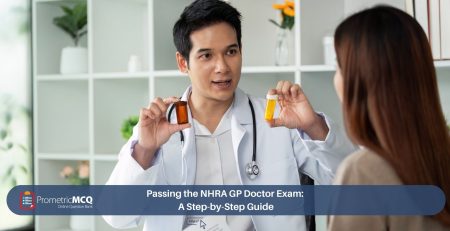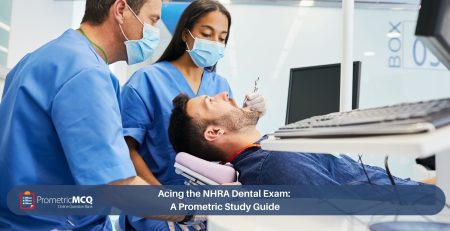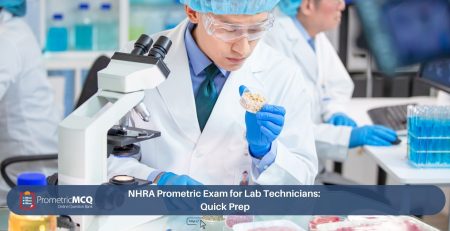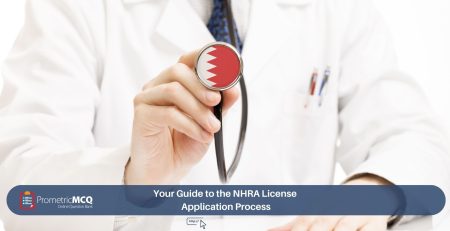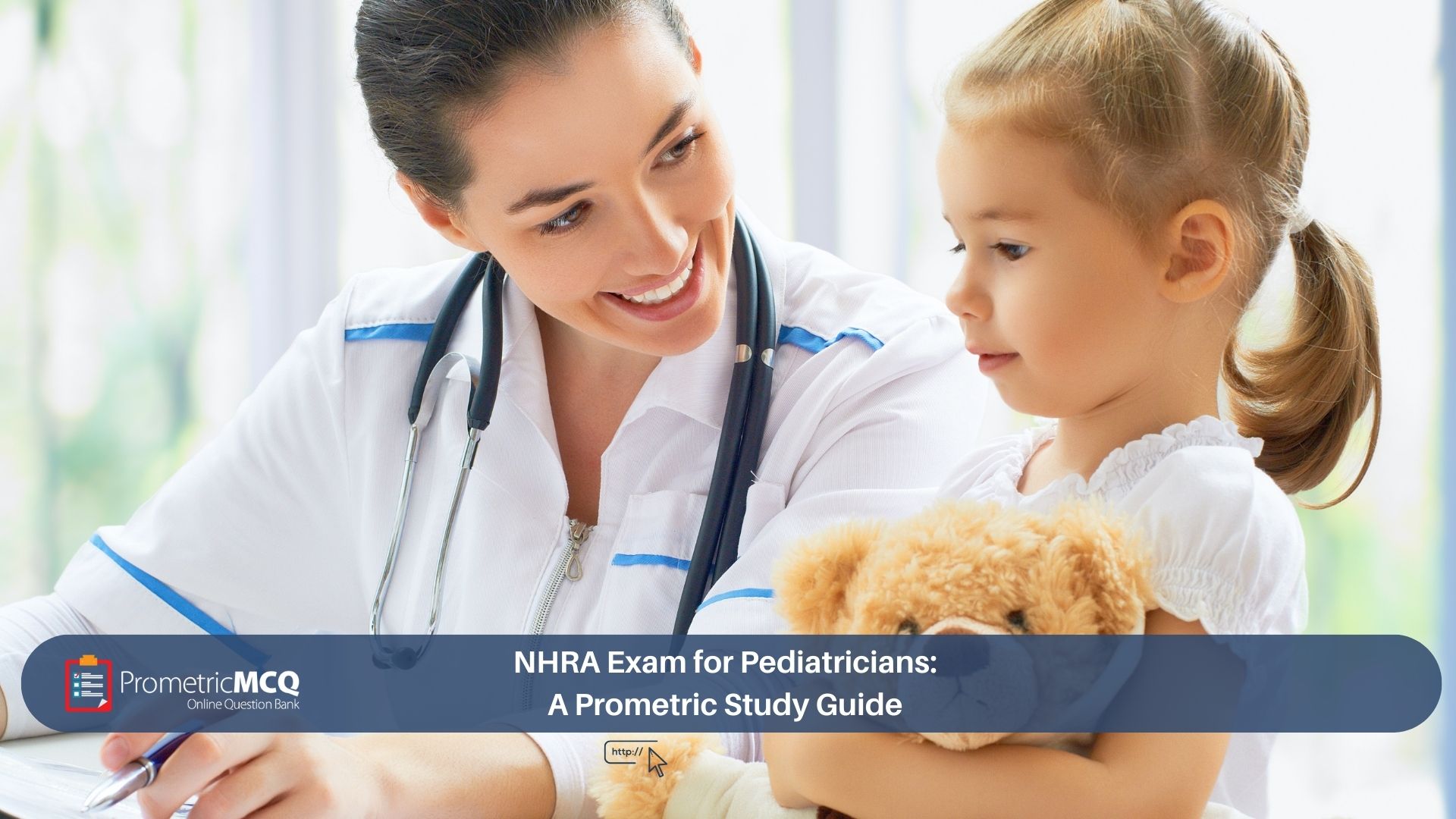
NHRA Exam for Pediatricians: A Prometric Study Guide
fatima@prometricmcq.com2025-09-30T00:46:51+00:00Table of Contents
ToggleNHRA Exam for Pediatricians: A Prometric Study Guide (2025)
The Kingdom of Bahrain’s healthcare system is renowned for its high standards and commitment to providing exceptional care, particularly for its youngest residents. For specialist pediatricians seeking to contribute to this esteemed environment, the National Health Regulatory Authority (NHRA) licensure exam is the critical and mandatory gateway. This Prometric-administered examination is far more than a test of general medical knowledge; it is a deep and rigorous assessment of your specialized skills in pediatrics, ensuring that every practitioner meets a world-class standard of competency.
The NHRA Pediatrician exam is designed to test your advanced clinical reasoning and decision-making abilities in complex, real-world pediatric and neonatal scenarios. Success is not achieved by simply reviewing undergraduate textbooks. The case-based Multiple-Choice Questions (MCQs) will challenge your knowledge of the latest evidence-based guidelines, your ability to manage acute emergencies, and your understanding of the nuances of pediatric subspecialties. Mastering this exam requires a dedicated, specialty-focused preparation strategy centered on high-quality, case-based questions.
This ultimate 2025 study guide is your comprehensive blueprint for the NHRA Pediatrician exam. We will meticulously dissect the exam’s pattern, provide a deep dive into the high-yield syllabus domains, and offer a series of realistic sample questions with detailed, guideline-based rationales. To ensure you are fully prepared, this guide is completed with a robust 10-point FAQ section to answer every question you might have about the process. Our mission is to provide you with the strategic framework needed to pass this exam with confidence and begin your pediatric career in Bahrain.
Key Takeaways for the NHRA Pediatrician Exam
- Neonatology is High-Yield: A significant portion of the exam focuses on the management of newborns, including resuscitation (NRP), jaundice, and respiratory distress.
- Emergency Management is Crucial: You must have a deep understanding of pediatric emergencies like DKA, status epilepticus, and severe asthma exacerbations, often requiring knowledge of PALS guidelines.
- **Know Your Milestones and Vaccines:** Developmental milestones and the national immunization schedule are frequently tested.
- Guideline-Based Answers are a Must: Your knowledge must be current and aligned with the latest international pediatric guidelines (e.g., from the AAP).
- Specialty-Specific MCQs are Essential: General medical question banks are insufficient. You need a QBank with a strong focus on advanced pediatrics and neonatology.
Deconstructing the NHRA Pediatrician Exam: Pattern and Syllabus
A successful study campaign begins with a clear understanding of the exam’s architecture. While it is administered by Prometric, the content is curated to meet the specific standards of the NHRA. This knowledge is foundational to your overall Bahrain NHRA exam preparation.
Core Exam Framework
- Administrator: Prometric
- Format: Computer-Based Test (CBT) with 100% MCQs.
- Structure: 150 MCQs.
- Duration: 3 hours (180 minutes).
- Scoring: A Pass/Fail result is provided. The unofficial passing score for specialists like pediatricians is estimated to be in the 65-70% range. There is no negative marking.
High-Yield NHRA Pediatrician Syllabus Breakdown
The exam covers the entire breadth of general pediatrics but with the depth expected of a specialist. A strategic study plan will focus on these high-yield domains.
| Pediatric Domain | High-Yield Topics and Key Concepts for 2025 |
|---|---|
| Neonatology | ~25-30%: This is a critically important area. You must master the Neonatal Resuscitation Program (NRP) algorithm. Other key topics include management of neonatal jaundice (phototherapy, exchange transfusion), respiratory distress syndrome (RDS), transient tachypnea of the newborn (TTN), meconium aspiration syndrome, and neonatal sepsis. |
| General Pediatrics & Ambulatory Care | ~20-25%: This domain covers the “bread and butter” of pediatrics. Focus on growth charts and developmental milestones, the complete immunization schedule (including contraindications), nutrition (breastfeeding, common deficiencies), and the management of common outpatient issues like otitis media, pharyngitis, and urinary tract infections. |
| Pediatric Emergencies & Critical Care | ~20%: This section tests your ability to handle life-threatening situations. You must know the management of pediatric status epilepticus, diabetic ketoacidosis (DKA), acute severe asthma, anaphylaxis, and the principles of pediatric advanced life support (PALS). Management of dehydration with oral and IV fluids is also a core topic. |
| Pediatric Subspecialties | ~25-30%: You are expected to have specialist-level knowledge of common and important conditions in various subspecialties. Cardiology: Recognition of common congenital heart diseases (VSD, ASD, ToF, PDA). Gastroenterology: Celiac disease, IBD. Hematology: Sickle cell disease, thalassemia. Nephrology: Nephrotic and nephritic syndromes. Infectious Diseases: Management of meningitis, sepsis, and pneumonia. |
Free NHRA Pediatrician Exam: Sample Questions and Answers
The best way to prepare is to engage with questions that reflect the exam’s specialist-level difficulty. Analyze each case, commit to an answer, and then meticulously study the rationale. For comprehensive practice, a dedicated QBank of Paediatrics MCQs is your most valuable asset.
Question 1: Neonatology
A full-term male infant is born to a mother with gestational diabetes. At 2 hours of life, the nurse notes that the infant is jittery and has a respiratory rate of 70 breaths/minute. A point-of-care blood glucose test is 35 mg/dL (1.9 mmol/L). According to standard protocols, what is the most appropriate next step in management?
- Initiate an immediate breastfeeding session.
- Administer an intravenous bolus of 10% Dextrose in water.
- Give a tube feeding of expressed breast milk.
- Recheck the blood glucose in one hour.
Correct Answer: B (Administer an intravenous bolus of 10% Dextrose in water.)
Rationale: This infant is demonstrating symptomatic hypoglycemia (jitteriness, tachypnea). A blood glucose level less than 40-45 mg/dL is considered hypoglycemic in a newborn. For an infant who is symptomatic, immediate intervention to raise the blood glucose is required, and oral feedings are often not rapid or reliable enough. The standard of care is to secure intravenous access and administer an IV bolus of D10W at 2 mL/kg, followed by a continuous glucose infusion.
Why other options are incorrect:
A & C: While enteral feeding is the goal for long-term management, it is not the appropriate first step for a symptomatic infant, as it may not correct the hypoglycemia quickly enough to prevent neurological injury.
D: Delaying treatment in a symptomatic hypoglycemic newborn is dangerous and against all standard protocols.
Question 2: Pediatric Emergencies
A 6-year-old known asthmatic is brought to the emergency department with severe respiratory distress. He is using accessory muscles, has a respiratory rate of 40/min, an oxygen saturation of 91% on room air, and is only able to speak in one-word sentences. On auscultation, his chest is silent. What is the most appropriate initial pharmacological intervention?
- Inhaled ipratropium bromide only.
- Intravenous magnesium sulfate.
- Continuous nebulized albuterol and intravenous corticosteroids.
- A single dose of oral dexamethasone.
Correct Answer: C (Continuous nebulized albuterol and intravenous corticosteroids.)
Rationale: This patient is in status asthmaticus, a life-threatening medical emergency. The “silent chest” is an ominous sign indicating severe bronchoconstriction with very poor air movement. The immediate priorities are aggressive bronchodilation and reduction of inflammation. The cornerstone of management for severe exacerbations is continuous nebulization with a short-acting beta-agonist (SABA) like albuterol. Systemic corticosteroids (preferably IV in a distressed patient, like methylprednisolone) are also critical and should be given immediately to start reducing airway inflammation.
Why other options are incorrect:
A: Ipratropium is an important adjunct but should always be given with a SABA, not alone.
B: Magnesium sulfate is a second or third-line therapy for severe asthma refractory to initial treatment; it is not the first intervention.
D: While steroids are essential, oral dexamethasone may not be absorbed quickly enough in a severely distressed child, and continuous bronchodilation is the most urgent need.
Frequently Asked Questions (FAQs) for the NHRA Pediatrician Exam
The exam is graded Pass/Fail. While the NHRA does not release an official percentage, the passing standard for specialist exams is higher than for GPs. The unofficial passing score is estimated to be in the 65% to 70% range. Aiming for consistent scores above 75% in practice tests is a robust strategy.
The difference is significant. The GP exam tests a broad range of adult and pediatric topics at a primary care level. The Pediatrician exam focuses exclusively on pediatrics and neonatology but with a much greater depth, covering complex diseases, advanced management algorithms (NRP/PALS), and subspecialty topics a GP would refer out.
While having the certifications themselves is important for practice, having a deep, working knowledge of the PALS (Pediatric Advanced Life Support) and NRP (Neonatal Resuscitation Program) guidelines is absolutely essential for the exam. Many questions in the emergency and neonatology sections are directly based on these algorithms.
The exam is based on international, evidence-based pediatric medicine. Your study should be centered on guidelines from major global bodies like the American Academy of Pediatrics (AAP) and the European Society for Paediatric Research (ESPR). You will not be tested on local administrative policies.
Primary Source Verification (PSV) by DataFlow is a mandatory verification of your credentials. For a pediatrician, this will include your medical degree, internship, pediatric residency/specialty qualification, and any other advanced certifications. A positive DataFlow report is required before the NHRA will issue your specialist license.
The most effective strategy is to use a high-quality question bank specifically designed for a pediatric board-level exam. This ensures the questions match the specialist-level complexity. This active learning approach is far superior to passively reading textbooks for mastering the clinical reasoning skills required.
No, the exam uses only generic (international non-proprietary) names for all medications. You must be proficient with generic names and be able to calculate pediatric dosages accurately.
The NHRA typically allows three attempts to pass the licensing exam. A waiting period is required between attempts. A failure indicates a need to significantly intensify your preparation, particularly by focusing on case-based question practice to identify and remedy knowledge gaps.
You need both. You must have a flawless understanding of the management of common but serious conditions (e.g., DKA, asthma, sepsis). You also need to be able to recognize the classic presentations of important “can’t miss” subspecialty diagnoses (e.g., Kawasaki disease, intussusception, VSD).
While the exam is based on international principles, it’s wise to be familiar with a standard immunization schedule, such as the one recommended by the CDC or WHO. The principles of vaccination (live vs. inactivated, contraindications) are more important than memorizing the exact timing in a specific country’s schedule.
Conclusion: Your Gateway to a Pediatric Career in Bahrain
The NHRA Pediatrician Exam is a rigorous and comprehensive assessment designed to ensure the highest standard of care for children in Bahrain. It is a challenging but achievable milestone for the dedicated specialist who prepares strategically. By focusing your study on high-yield domains, grounding your knowledge in the latest international guidelines, and committing to intensive practice with high-quality, case-based MCQs, you can master the content and pass with confidence. Success on this exam is your definitive step toward a rewarding career as a pediatrician in the Kingdom of Bahrain.
Ready to Prove Your Expertise and Ace Your NHRA Pediatrician Exam?
Our comprehensive Pediatrics MCQ package is filled with high-yield clinical cases, detailed, guideline-based rationales, and simulated exams designed to cover the entire NHRA syllabus and guarantee your success.




